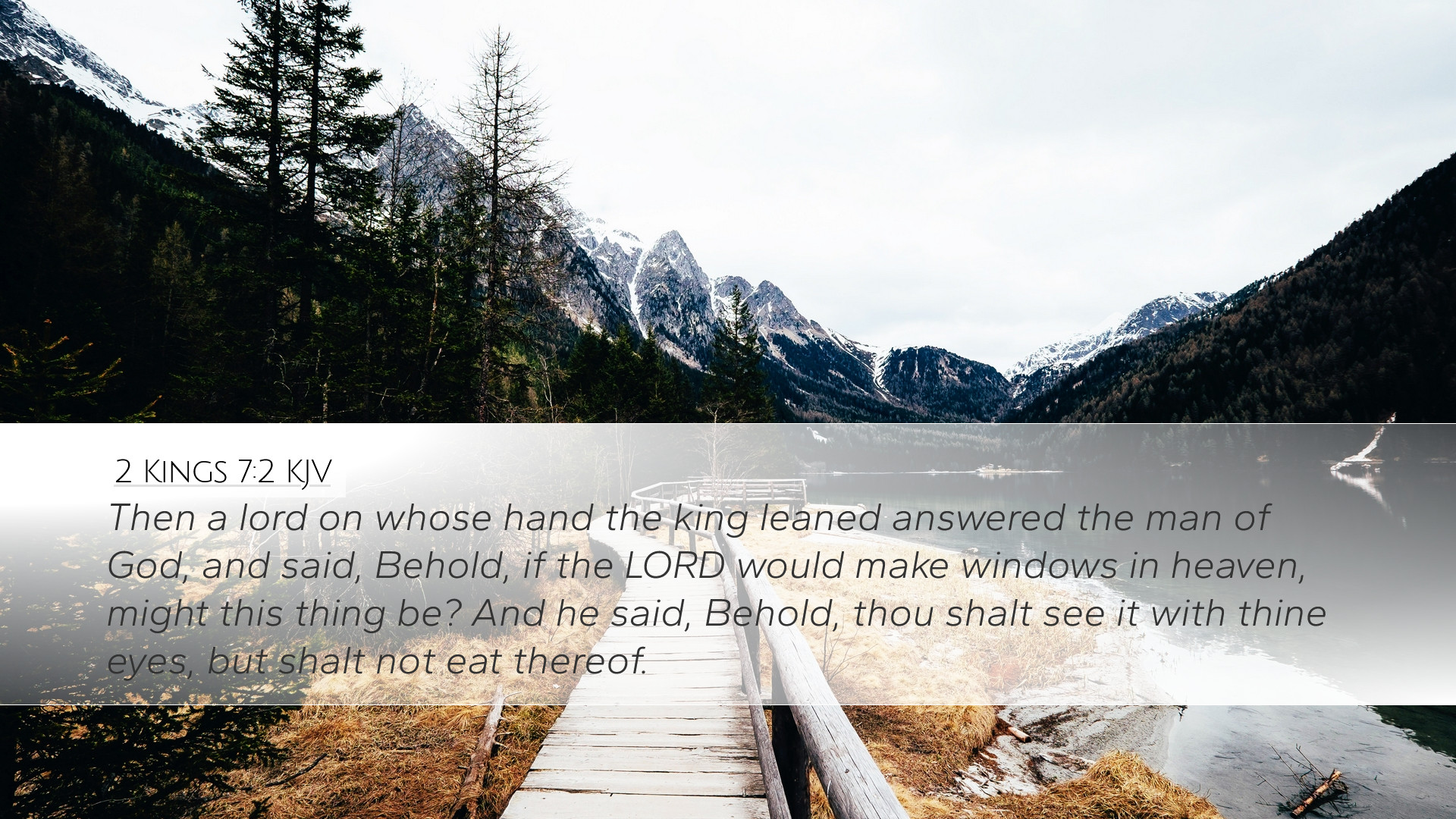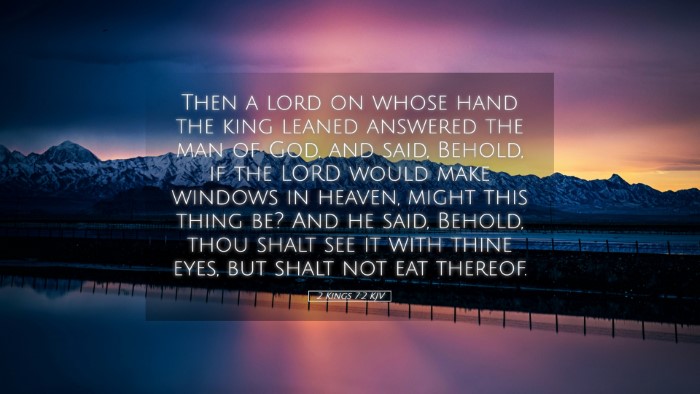Old Testament
Genesis Exodus Leviticus Numbers Deuteronomy Joshua Judges Ruth 1 Samuel 2 Samuel 1 Kings 2 Kings 1 Chronicles 2 Chronicles Ezra Nehemiah Esther Job Psalms Proverbs Ecclesiastes Song of Solomon Isaiah Jeremiah Lamentations Ezekiel Daniel Hosea Joel Amos Obadiah Jonah Micah Nahum Habakkuk Zephaniah Haggai Zechariah Malachi2 Kings 7:2
2 Kings 7:2 KJV
Then a lord on whose hand the king leaned answered the man of God, and said, Behold, if the LORD would make windows in heaven, might this thing be? And he said, Behold, thou shalt see it with thine eyes, but shalt not eat thereof.
2 Kings 7:2 Bible Commentary
Commentary on 2 Kings 7:2
Bible Verse: "Then a lord on whose hand the king leaned answered the man of God, and said, Behold, if the Lord would make windows in heaven, might this thing be?"
Overview
The narrative of 2 Kings 7 unfolds against a backdrop of famine in Samaria, a dire predicament for the people of Israel. Here, verse 2 encapsulates a moment of skepticism and earthly reasoning in the face of divine promise. The replying lord represents a mindset that questions God's ability to deliver miraculous provision amidst overwhelming difficulties.
Contextual Background
This passage transpires during a significant siege by the Arameans, leading to extreme famine conditions. The biblically chronicled events highlight the severity of the situation and the desperate conditions under which desperation flourishes.
The context is essential: the prophetic word delivered by Elisha that a miraculous provision from God would come in a short time, promising hope where despair reigned.
Commentatorial Insights
-
Matthew Henry
Matthew Henry notes the importance of faith in God’s promises, contrasting the lord's doubt with the assurance of the prophet Elisha. He emphasizes that doubt can often arise from a close proximity to immediacy of suffering, showcasing how despair can impact perception. Henry raises the point that trusting in divine intervention requires a foundation of faith rather than empirical certainty. He also suggests that the skepticism voiced by the helper of the king not only reflects a personal disbelief but symbolizes broader resistance to divine intervention and hope.
-
Albert Barnes
Albert Barnes highlights the rhetorical nature of the lord’s question of whether God could open "windows in heaven." He indicates that this phrase represents an extraordinary outpouring of blessings, emphasizing the misconception that divine providence operates under human limitations. Barnes argues that the negativity of this comment showcases a reliance on the tangible rather than the transcendental, encapsulating a human heart estranged from divine potential.
-
Adam Clarke
Adam Clarke delves into the socio-economic implications of the famine, underscoring how the situation led to hopelessness, feeding into the lord’s scornful response. He points out the dismissal of the prophecy as stemming from a place of logical reasoning where God's promises seem unreasonable or impossible. Clarke warns against the temptation of measuring divine capacities through human understanding and encourages scholars to recognize that divine possibilities often surpass human logic.
Theological Reflections
The statement made by the lord can be viewed as an archetype of human skepticism towards divine sovereignty in difficult circumstances. It illuminates a significant theme in scripture—the tension between human doubt and divine promise.
This narrative prompts both theological and practical questions: How do we respond in faith when faced with circumstances that seem insurmountable? How do we reconcile our doubts with God's assurances?
While the lord represents the voice of disbelief, it serves as a reminder to believers to hold firm to God's words and promises, particularly when faced with trials. Faith in miraculous provision can transform despair into hope.
Practical Application
For pastors and theologians, this passage acts as a powerful illustration on the significance of conveying messages of hope in congregational settings. It encourages leaders to motivate their congregations to trust in God’s ability to provide amidst adversities.
Congregations are often confronted with worldly skepticism. This verse serves as a catalyst for dialogue about faith and trust in God's outcomes, even when circumstances seem bleak. Believers are challenged to be proactive in cultivating faith that aligns with the promises of God, just as Elisha exemplified trust in God’s word amidst the turmoil.


